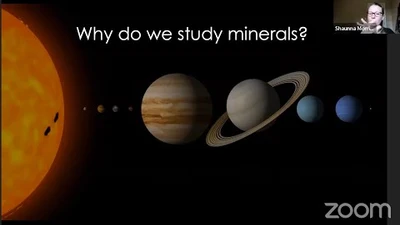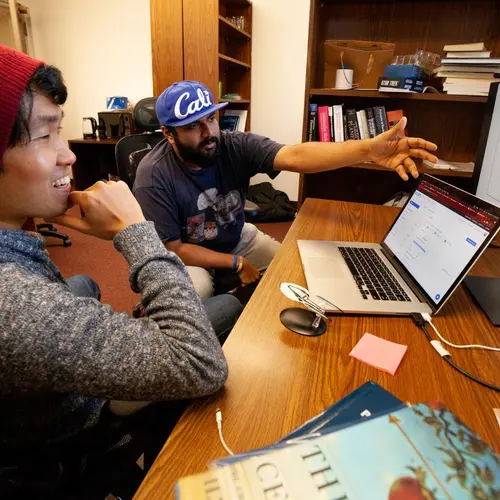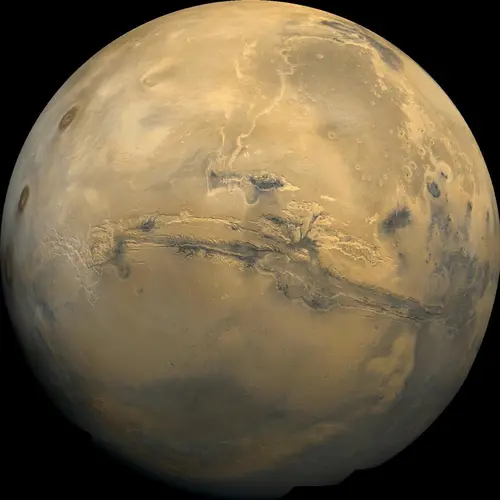Current Projects
This NAI team will explore catalysis of electron transfer reactions by prebiotic peptides to microbial ancestral enzymes to modern nanomachines, integrated over four and a half billion years of Earth’s changing geosphere. Theme 1 focuses on the synthesis and function of the earliest peptides capable of moving electrons on Earth and other planetary bodies. Theme 2 focuses on the evolutionary history of “motifs” in extant protein structures. Theme 3 focuses on how proteins and the geosphere co-evolved through geologic time.
Learn moreRecent advances in data generation techniques, whether by experiments, measurements, or computer simulation, quickly provide complex data characterized by source heterogeneity, multiple modalities, often high volume, high dimensionality, and multiple scales (temporal, spatial, and function). In turn, science and engineering disciplines are rapidly becoming more and more data-driven by a variety of goals (the Deep Carbon Observatory is an exemplar); higher sample throughput, high resolution, additional physics/ chemistry/ biology, new instrumentation, and new integrated databases all with the ultimate aim of better understanding/modeling of the complex systems and their dynamics that underlie the processes being studied. However, analyzing libraries of complex data requires managing the inherent complexity to allow integration of the information and knowledge across multiple scales and spanning traditional disciplinary boundaries. Significant advances in methods, tools, and applications for data science and informatics over the last five years can now be applied to multi- and inter-disciplinary problem areas. Virtual Observatories, Virtual Organizations, complex networks, linked data across systems, full life cycle data management, data integration, citation, and attribution are now increasingly becoming an integral part of projects whether small (few people, one organization, modest data needs) or the very large (many investigators, organizations, diverse data needs).
Given this increasing data deluge, it is clear that each of the Directorates in the Deep Carbon Observatory faces diverse data science and data management needs to fulfill both their decadal strategic objectives and their day-to-day tasks. This project will assess in detail the data science and data management needs for each DCO directorate and for the DCO as a whole, using a combination of informatics methods; use case development, requirements analysis, inventories, and interviews.
Learn moreEarth's living and non-living components have co-evolved for 4 billion years through numerous positive and negative feedbacks. Earth and life scientists have amassed vast amounts of data in diverse fields related to planetary evolution through deep time-mineralogy and petrology, paleobiology and paleontology, paleotectonics and paleomagnetism, geochemistry and geochrononology, genomics and proteomics, and more. Yet our ability to document, model, and explore these complex, intertwined changes has been hampered by a lack of data integration from these complementary disciplines. We propose a new program of data-driven discovery in the Earth and life sciences. We want to develop, curate, and integrate diverse data resources to focus on our planet's changing near-surface oxidation state and the rise of oxygen through deep time-a critical problem that exemplifies this co-evolution and underscores the opportunities and challenges of deciphering transient characteristics of Earth's history. Using abductive reasoning applied to our newly developed "Deep-Time Data Infrastructure" to discover patterns in the evolution of our planet's environment, we will create and merge the integrated data sets, statistical methods, and visualization tools that inspire and test hypotheses applicable to modeling Earth's past and today's changing environment.
Learn moreCV
- 2021 Rensselaer Polytechnic Institute - Ph.D. Multi-disciplinary Science
Advisor: Peter Fox, Deborah McGuinness
Thesis: “Towards Automated Axiom Generation: A semi-automated approach to generating “knowledge and rule base” corpora from text narratives.” - 2015 Rensselaer Polytechnic Institute - M.S. Information Technology and Web Science
Advisor: Peter Fox
Project: “To Define Pain Using The Facial Action Coding System (FACS).” - 2013 University of Mumbai - B.Eng.
Thesis: “Green Town Mayor: A Real-Time Strategy Game.”
-
2023 - Present: Research Scientist
-
2021-2023 Geoinformatics Scientist, Earth and Planets Laboratory, Carnegie Institution for Science.
-
2014-2021 Research Assistant, Tetherless World Constellation, Rensselaer Polytechnic Institute.
-
2017 Visiting Investigator, Geophysical Laboratory, Carnegie Institution for Science.
-
2015 Research Intern, IBM Research, New Delhi, India.
-
Selected as part of IBM’s Global Fellowship Initiative.
-
2014 Summer Intern, Pacific Northwest National Lab, Pasco, WA.
-
2012 Intern, Innovation Labs, Tata Consultancy Services Ltd., Mumbai, India.
- 2012-2013 Research Analyst, Greycaps Private Ltd., Bangalore, India.
- Member, Geological Society of America
- Member, American Geophysical Union
- Member, Gamma Nu Eta Honor Society.
- Member, Computer Society of India.
- Data Science
- Data Analytics
- Data Modeling
- Machine Learning
- Deep Learning
- Information Extraction
- Data Visualization
- Semantic Web
- X-Informatics
- Ontology Engineering
- Situation Calculus
- Semantic Reasoning
- Early Career Travel Grant, AGU Fall Meeting 2021, Earthcube, 2021.
- Student Travel Grant Award, US Semantic Technologies Symposium (US2TS), Artificial
- Intelligence Journal, Elsevier, 2019.
- Outstanding Student Presentation Award, American Geophysical Union, 2018.
- Third Place, Rensselaer Business Analytics case competition, 2016.
- Founder’s Award of Excellence, Rensselaer Polytechnic Institute, 2015.
Highlights
Recent Talks

Minerals and Prebiotic Chemistry - Shaunna Morrison - Anirudh Prabhu - Micah Schaible

Insights from Knowledge Graphs by Anirudh Prabhu on 29 February 2020

AGU 2021- Anirudh Prabhu Geoinformatics Scientist



